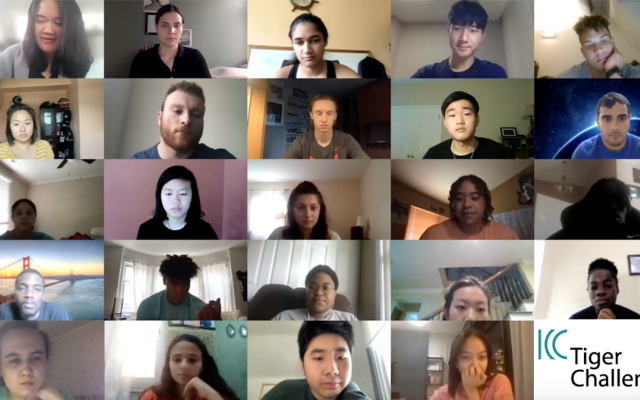
After an initial overview of the philosophy and history behind human-centered design, eighteen Tiger Challenge students in four teams were tasked with a design challenge of a “Playground for College Students Post-Covid”.
In a short (time is relative in the design thinking world) two-hour sprint, students experienced first-hand the three phases of design thinking as defined by the Tiger Challenge: Contextualization (empathize, synthesize), Conceptualization (ideation, prototyping), Implementation (pitching).
In the Contextualization phase, the students shared with each other their experiences as college students engaging in “play” and “joy”, and their pain points of having been through more than a year of Covid isolation and limited in-person interactions. After synthesizing the insights, the teams were able to come up with opportunities for design in the form of “How Might We” questions, which they took into the Conceptualization phase for some individual and group brainstorming sessions.
“Fascinated with how society can help itself and how our team can facilitate that in a productive, design-thinking oriented way, " said cohort member Nadya Fishchenko '23.
The four teams then shared their design solutions with the rest of the cohort. These solutions were by no means the most innovative and creative ideas at this point, but for many students in the program, it was the first hands-on experience with the different stages along the process of human-centered design.
Courtney Tseng '21, program associate, remarked "On a screen displaying current Tiger Challenge members from all over the world, I could feel the excitement and determination to jumpstart the design-thinking process and innovation needed for Tiger Challenge. Even though the design sprint was new for most members, they did not hesitate to buy into design-thinking and challenged the current norms of society."
The teams came up with a “lifestyle-reflector” a free indoor and outdoor space that evokes nostalgia and mental relaxation, a playground that creates connectivity through competitive and inclusive activities. Just imagine what these students might come up with given more time - perhaps ten weeks?
“We’re only three days in, but I’m already seeing a strong bias toward action in this cohort. I can tell that another summer on Zoom will have nothing against these students. I am looking forward to asking a lot of questions with these students, getting to the core of these important societal issues, and building towards truly impactful solutions.” - Jessica Leung, Design Program Manager and Lecturer
While getting the first taste of human-centered design, the students have also had their initial meetings with community partners and faculty advisors to involve the stakeholders in the process as soon as possible.
“I'm excited to continue exploring design thinking, especially as we build up to the interviews, to really start talking to the individuals themselves and exploring not only how they perceive themselves, but how they perceive others to perceive them,” said cohort member Kevin Bruce '22.
Check back for updates on how these team progress through their ten-week Tiger Challenge experience.